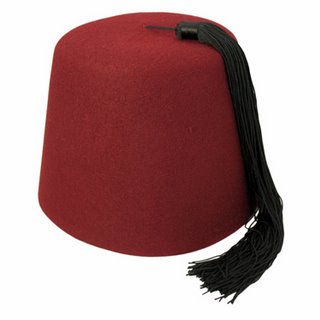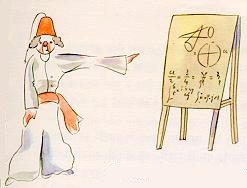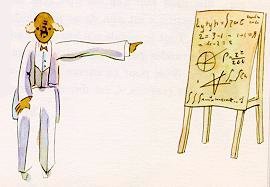You'll Be My Day And Night
Time and again, I come back to the fez.
 A hat either fits or does not fit on one's head, suits or does not suit one's style. I happen to love the fez, though I have no cultural attachment to it and it doesn't amplify my already ample beauty. Which is ample. For a party years ago, I cut up my hat to make a pattern. I then wrote instructions for a friend in Wisconsin whose access to paper fezzes was spotty at best. Some sacrifices must be made!
A hat either fits or does not fit on one's head, suits or does not suit one's style. I happen to love the fez, though I have no cultural attachment to it and it doesn't amplify my already ample beauty. Which is ample. For a party years ago, I cut up my hat to make a pattern. I then wrote instructions for a friend in Wisconsin whose access to paper fezzes was spotty at best. Some sacrifices must be made!You and Your Paper Fez
You’ll need:
• One (1) red stencil.
• One (1) buttload. Sturdy red posterboard. 24” x 36”.
• One (1) pencil.
• One (1) pair. Scissors.
• One (1) bottle. Elmer’s Glue.
• One (1) box. Straight pins.
• One (1) bag. Wussy rubber bands.
• One (1) roll. Scotch tape.
• Optional: first aid kit, helpful pets.
Directions:
Run with scissors. Spill glue. Draw on walls. Perforate fingers. Pre-disastered, you are now ready to begin.
1. Lay stencil on one sheet of posterboard. Trace with pencil. Now turn pencil over and use sharp lead side. If you are terribly clever (or an ordinary woman) you can fit three tracings per posterboard.
2. Carefully, use scissors to cut out your paper fez. Keep first aid kit handy.
3. Fold Part A toward Part B, stopping when A and B are perpendicular to each other.
4. Fold individual tabs to form right angles from Part A.
5. Lay Part A on floor such that tabs stick up like dead spider legs.
6. Gently bend Part B until ends meet and B forms a conic section. When it looks like an upside-down fez, glue matched ends together.
7. Immediately, pin together wet, gluey ends. Nothing fancy. Just pin like you’re torturing a voodoo doll.
8. Secure wet, gluey, pinned Part B with rubber bands. Let dry for 12 hours.
9. Re-glue when helpful pets discover snapping rolling pin cushion toys.
10. Tape tabs to inside of Part B. Remove pins and rubber bands. Garnish and serve.
This is obviously meant to be silly, though the fez has a very serious history. If you think back, you will remember mention of it in The Little Prince.
 Grownups, you will recall, may be completely fooled by the appearances of things. In the story, a scientist presents a theory to a conference in traditional Turkish attire, complete with fez. Because the grownups can't see past his appearance, the scientist is dismissed out of hand. Then traditional attire is outlawed in Turkey. The scientist presents his theory again in Western costume and his theory is accepted. It is a triumph of form and an accident of function.
Grownups, you will recall, may be completely fooled by the appearances of things. In the story, a scientist presents a theory to a conference in traditional Turkish attire, complete with fez. Because the grownups can't see past his appearance, the scientist is dismissed out of hand. Then traditional attire is outlawed in Turkey. The scientist presents his theory again in Western costume and his theory is accepted. It is a triumph of form and an accident of function. Wikipedia:
Wikipedia:During the reign hi[sic] the Sultan Mahmud Khan II (1808-39), a European code of dress gradually replaced the traditional robes worn by members of the Ottoman court. The change in costume was soon emulated by the public and senior civil servants, followed by the members of the ruling intelligentsia and the emancipated classes throughout the Ottoman Empire. While European style coats and trousers were gradually adopted, this change did not extend to headwear. Peaked or broad brimmed headdresses such as the top hat did not meet the Islamic requirement that men should press their heads to the ground when praying. Accordingly the Sultan issued a firman (royal decree) that the checheya headgear in a modified form would become part of the formal attire of the Turkish Empire irrespective of his subjects' religious sects or millets.
In post-Ottoman Turkey, the fez was discouraged & ultimately banned under the leadership of the revered Mustafa Kemal (Ataturk) through the Hat Law in 1925 & the Law Relating to Prohibited Garments in 1934.
This omits mention of the riots that ensued. It's just a hat, you see. Nothing serious until the shooting starts. I should tell you my co-worker has been out with a backache for a couple of weeks that was actually spinal meningitis, and two days ago her heart stopped. She is currently on life support and the doctors have advised her family they should pull the plug. I walked with her to our cars one Thursday afternoon, talking about our Thursday evening plans, and now we find ourselves bargaining with the snake. What do we see here, as children? As grownups? What is before our eyes?
Labels: To Take Your Heart Away



0 Comments:
Post a Comment
<< Home